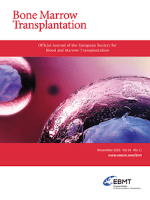
BONE MARROW TRANSPLANTATION
Scope & Guideline
Empowering the Future of Bone Marrow Medicine.
Introduction
Aims and Scopes
- Hematopoietic Stem Cell Transplantation (HSCT):
The journal emphasizes research on the efficacy, safety, and outcomes of HSCT for various hematological disorders, including leukemia, lymphoma, and myelodysplastic syndromes. This encompasses studies on conditioning regimens, donor selection, and post-transplant care. - Graft-versus-Host Disease (GVHD):
A significant part of the journal's focus is on the prevention, diagnosis, and treatment of GVHD, a common complication following HSCT. This includes exploring novel prophylactic strategies and therapies for managing acute and chronic GVHD. - Innovative Therapies and Techniques:
Research on novel cellular therapies such as CAR-T cell therapy, as well as advancements in immunotherapy and targeted therapies, is frequently published, reflecting the journal's commitment to integrating new treatment modalities into clinical practice. - Infectious Complications and Management:
The journal addresses the challenges of infectious complications in HSCT recipients, including the management of viral reactivations (e.g., CMV, EBV) and bacterial infections, highlighting the importance of prophylactic strategies and treatment protocols. - Patient-Centered Care and Quality of Life:
Studies examining the psychosocial aspects, quality of life, and long-term outcomes of patients undergoing HSCT are also a critical focus, emphasizing the holistic approach to patient care.
Trending and Emerging
- Post-Transplant Cyclophosphamide (PTCy):
There is a growing body of research dedicated to the use of PTCy as a prophylactic treatment in haploidentical stem cell transplantation, highlighting its effectiveness in reducing GVHD and improving transplant outcomes. - CAR-T Cell Therapy:
The ongoing exploration of CAR-T cell therapy in various hematological malignancies, particularly in relapsed or refractory cases, is a prominent theme, showcasing its integration into transplantation protocols. - Patient Engagement and Quality of Life Research:
An increasing focus on patient-reported outcomes and quality of life in HSCT recipients signifies a shift towards more patient-centered research, emphasizing the importance of psychosocial factors in treatment success. - Microbiome Research in Transplantation:
Emerging studies investigating the role of gut microbiota in transplant outcomes and GVHD are gaining traction, reflecting a broader interest in the interplay between microbiome health and patient recovery. - Use of Advanced Imaging and Biomarkers:
The integration of advanced imaging techniques and biomarker research to predict outcomes post-transplantation is becoming more common, enhancing the ability to tailor treatments to individual patient needs.
Declining or Waning
- Traditional Conditioning Regimens:
There is a noticeable decrease in studies focused solely on traditional myeloablative conditioning regimens as researchers increasingly explore reduced-intensity and non-myeloablative approaches, which are becoming more favored in practice. - Single Donor Transplantation Studies:
Research focusing on single donor transplantation models, particularly in less diverse donor settings, is becoming less common as the field shifts towards exploring haploidentical and mismatched donor strategies, which are gaining traction. - Basic Science Studies on Stem Cell Biology:
There seems to be a waning interest in basic science research solely focused on stem cell biology without direct clinical applications, as more research is geared towards translational studies and clinical outcomes. - Longitudinal Studies with Limited Sample Sizes:
The frequency of longitudinal studies with small sample sizes appears to be decreasing, as there is a growing emphasis on larger, multicenter studies that offer more robust data and generalizable findings.
Similar Journals
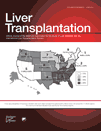
LIVER TRANSPLANTATION
Shaping the Future of Transplantation through Cutting-edge Research.LIVER TRANSPLANTATION, published by Lippincott Williams & Wilkins, stands at the forefront of hepatology and transplantation research, with a prestigious Q1 rating across the categories of Hepatology, Surgery, and Transplantation as of 2023. Since its inception in 2000, this journal has been dedicated to disseminating high-quality, cutting-edge research that advances the understanding and practice of liver transplantation. With an impressive ranking of 23rd out of 551 in Surgery and 9th out of 54 in Transplantation, it occupies an esteemed position in the academic landscape, attracting contributions from leading experts in the field. The journal's rigorous peer-review process ensures the publication of impactful studies, innovative clinical practices, and vital insights into patient management. By fostering a collaborative environment for researchers, clinicians, and students alike, LIVER TRANSPLANTATION serves as an essential resource for those engaged in the complexities of liver transplantation and related fields. Join the community committed to advancing liver health and transplantation science.

Journal of Hematology
Innovating Insights into Blood DisordersThe Journal of Hematology, published by ELMER PRESS INC, serves as a pivotal platform for disseminating cutting-edge research in the field of hematology. With an ISSN of 1927-1212 and an E-ISSN of 1927-1220, this journal is committed to advancing scientific knowledge and clinical practice through high-quality peer-reviewed articles encompassing all aspects of blood disorders, from basic science to health policy implications. While the journal currently operates under a traditional access model, it nonetheless prioritizes the rapid publication of significant findings, ensuring that researchers, clinicians, and students have timely access to the latest advancements in hematological research. Positioned to bridge gaps in knowledge and foster collaboration among scholars worldwide, the Journal of Hematology is an essential resource for anyone invested in this vital area of medicine.

ANNALS OF HEMATOLOGY
Fostering interdisciplinary dialogue in hematology and medicine.ANNALS OF HEMATOLOGY, published by Springer in Germany, stands as a premier platform for advancing knowledge in the field of hematology and medicine at large. With a significant impact factor and recognized rankings—Q2 in Hematology and Q1 in Medicine (miscellaneous) as of 2023—this journal is pivotal for researchers, clinicians, and students who are keen on exploring the latest developments in blood disorders, treatments, and innovative methodologies. Its broad scope encompasses original research, reviews, and discussions that aim to foster interdisciplinary dialogue, ensuring that the latest findings and theories are accessible to the scientific community. Although not an open-access journal, its rigorous peer-review process guarantees high-quality contributions, thereby solidifying its reputation as a vital resource in the hematological field. Founded in 1991, the ANNALS OF HEMATOLOGY continues to evolve, converging invaluable insights from both basic and clinical research until 2024. For those dedicated to improving patient outcomes and advancing hematological science, this journal remains an essential reference.
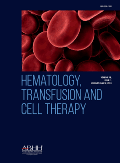
Hematology Transfusion and Cell Therapy
Empowering discoveries in transfusion medicine.Hematology Transfusion and Cell Therapy, published by Elsevier, is a leading Open Access journal dedicated to advancing the fields of hematology, immunology, and transfusion medicine. Since its establishment in 2018, this journal has provided a vital platform for sharing innovative research and clinical advancements in the management of blood disorders and cellular therapies. Based in Brazil, it attracts a global audience, facilitating access to high-quality research that influences clinical practice and policy. With a current impact factor that places it in the Q3 category for both hematology and immunology as of 2023, the journal is recognized for its rigorous peer-review process and commitment to disseminating significant findings. By featuring a diverse range of articles, from original research to reviews, Hematology Transfusion and Cell Therapy aims to foster collaboration and knowledge sharing among researchers, professionals, and students alike, empowering them to tackle emerging challenges in their fields.
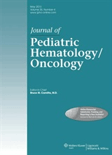
JOURNAL OF PEDIATRIC HEMATOLOGY ONCOLOGY
Enhancing understanding, improving outcomes for young patients.JOURNAL OF PEDIATRIC HEMATOLOGY ONCOLOGY, published by Lippincott Williams & Wilkins, serves as a vital platform for the dissemination of cutting-edge research and insights in the fields of pediatric hematology and oncology. Since its inception in 1979, the journal has maintained a commitment to advancing knowledge through peer-reviewed articles that contribute to the understanding and treatment of blood disorders and cancers in children. With an impact factor reflective of its academic contributions, the journal is positioned in the Q3 quartile across key medical categories — Hematology, Oncology, and Pediatrics, Perinatology and Child Health — indicating its relevance and influence in the field. While it does not currently offer open access options, the journal remains a crucial resource for researchers, clinicians, and students dedicated to improving pediatric care and outcomes. Researchers are encouraged to contribute to this esteemed journal as it seeks to bridge the gap between clinical practice and research, fostering innovation and improved quality of life for young patients affected by hematologic and oncologic conditions.
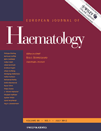
EUROPEAN JOURNAL OF HAEMATOLOGY
Exploring the Frontiers of Hematological ScienceEUROPEAN JOURNAL OF HAEMATOLOGY, published by Wiley, serves as a vital resource for experts in the field of hematology, focusing on the latest advancements in blood disorders and therapies. With an ISSN of 0902-4441 and an E-ISSN of 1600-0609, this esteemed journal has been disseminating knowledge since 1986 and continues to thrive, converging its visionary approach through to 2024. Notably, it holds a distinguished Q2 ranking in Hematology and an impressive Q1 ranking in the broader category of Medicine (miscellaneous) as of 2023, highlighting its significant contribution to the scientific community. With a Scopus rank of #45/137 and a 67th percentile in the field, the journal is recognized for its rigorous peer-reviewed research, making it an indispensable publication for researchers, practitioners, and students aiming to stay at the forefront of hematological studies. Though not an open-access journal, it ensures broad accessibility to critical findings via its subscription model, thus fostering an informed and globally engaged audience.

Hematologie
Pioneering Discoveries in HematologyHematologie is a highly regarded journal in the field of hematology, published by JOHN LIBBEY EUROTEXT LTD. With an ISSN of 1264-7527 and an E-ISSN of 1950-6368, this journal has established itself as a vital resource for researchers, clinicians, and students dedicated to advancing the understanding of blood disorders and treatments. Although the journal's coverage in Scopus was discontinued in 2018, it has continually provided invaluable insights and research findings. The journal aims to foster knowledge sharing and discussion in hematology, exploring innovative methodologies and emerging trends in the field. With a commitment to quality research, Hematologie remains an essential platform for disseminating critical findings that can drive clinical practice and influence future studies in hematological sciences.
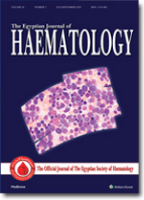
Egyptian Journal of Haematology
Pioneering Knowledge in Hematologic Malignancies and CareThe Egyptian Journal of Haematology, published by WOLTERS KLUWER MEDKNOW PUBLICATIONS, stands as a pivotal resource in the field of hematology, particularly within the context of Egypt and the broader Middle Eastern region. This journal is dedicated to disseminating high-quality research that explores the latest advancements in blood disorders, hematologic malignancies, and transfusion medicine. With a focus on original research, case studies, and reviews, it aims to provide a comprehensive platform for hematologists, researchers, and healthcare professionals to enhance their understanding and management of hematological conditions. Although it is not an open-access journal, the rigorous peer-review process ensures that only the most impactful studies are published, contributing to the journal's reputation in the academic community. The Egyptian Journal of Haematology serves as an essential tool for advancing knowledge, improving clinical outcomes, and fostering collaboration among experts in the field.
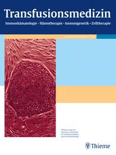
Transfusionsmedizin
Innovating blood transfusion practices through research.Transfusionsmedizin is a premier journal dedicated to the field of transfusion medicine, published by the renowned GEORG THIEME VERLAG KG. With an ISSN of 2191-8805 and an E-ISSN of 2191-8813, this journal serves as a vital platform for disseminating cutting-edge research and clinical advancements in blood transfusion practices. Although it operates under a subscription model, the journal is committed to high-quality peer-reviewed content that addresses contemporary challenges and innovations in transfusion therapy. By fostering dialogue among researchers, clinicians, and students, Transfusionsmedizin aims to advance patient care and enhance the safety and efficacy of transfusion practices globally. Its contributions are essential for professionals engaged in transfusion science, hematology, and related medical fields, solidifying its reputation as a critical resource for staying abreast of the latest developments in transfusion research.

JOURNAL OF CLINICAL IMMUNOLOGY
Pioneering Insights into Immune MechanismsJOURNAL OF CLINICAL IMMUNOLOGY, published by SPRINGER/PLENUM PUBLISHERS, is a leading journal in the field of immunology, with an impressive standing as reflected in its Q1 ranking in both Immunology and Immunology and Allergy for 2023. With a history of publication dating back to 1981 and an E-ISSN of 1573-2592, this journal aims to disseminate cutting-edge research on diagnostic methods, therapeutic strategies, and understanding the mechanisms underlying immune responses. Its significant impact is underscored by its Scopus rankings, where it is placed in the top 15% of journals covering immunology and microbiology. The journal does not currently operate under an Open Access model, yet offers a robust platform for sharing essential findings that contribute to advancements in clinical immunology. As a resource for researchers, professionals, and students, the JOURNAL OF CLINICAL IMMUNOLOGY is pivotal in fostering dialogue and disseminating knowledge that enhances our understanding of immune-related diseases.